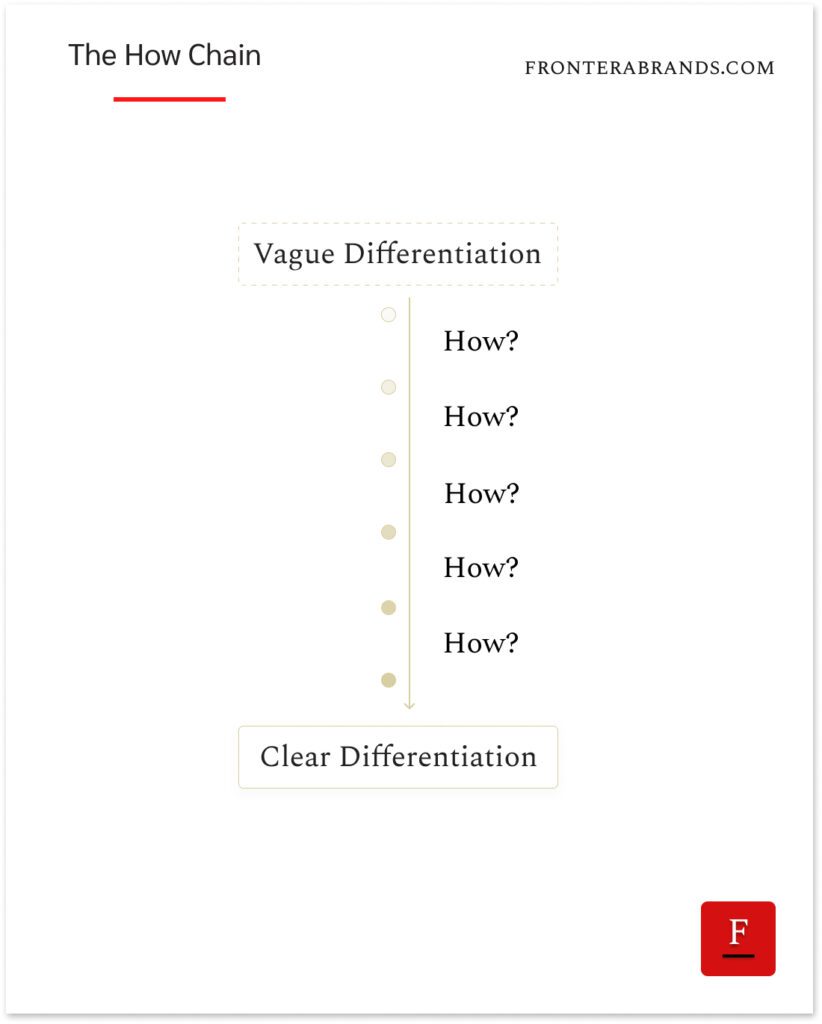♦️ A simple questioning method to reveal your brand’s onlyness
|
You might have seen it on the news. On Monday, there was a blackout in Spain (where I live) for 12 hours. No electricity. No phone line. No traffic lights, no metros, no trains. Some people got stuck in elevators for hours. Some others couldn’t buy food since they didn’t have cash. Total chaos. When something like this happens, everybody has one question in mind: “Why did it happen?” What authorities know is that there was a “sudden loss of 15GW electricity generation in five seconds, equivalent to 60% of national demand.” But this raises another question: “Why was there a sudden decrease in electricity generation?” Apparently, the electricity infrastructure is too complex to find an answer quickly. So we’ll have the answer in a few weeks. But the reason I told you this is not to give you the news. This type of serial “Why?” questioning is used in quality circles to find root causes of issues. Taiichi Ohno, the father of the Toyota Production System, called it the 5 Whys. So when there is a problem, asking “why” only once or twice gives you surface-level answers. To get to the underlying reasons, you have to keep asking why and dig deeper. As I had a lot of time during the blackout, I thought about applying the same logic to positioning. But here’s a caveat. To find what makes your brand different, another question is more useful. It’s how. Many founders and executives do ask themselves: “How are we different from others?” But they usually settle for the first answers, which are shallow. Your competitors can also give more or less the same answers. So asking a few more hows can get you closer to finding your brand’s real differentiating idea.
Think about an M&A advisory firm: “How are we different from our competitors? By providing a high-quality service. How do we provide a high-quality service? By using our mergers and acquisitions expertise. How do we use our mergers and acquisitions expertise? By guiding our clients at every step when they are in the process of selling their business. How do we guide our clients at every step while they are selling their business? By using our proprietary valuation benchmarks, assessments, and negotiation techniques.” Bingo. That’s something competitors are less likely to have. You see how a vague “high-quality service” becomes specific when you keep digging. Most B2B brands claim to be different only with the first or second answer. But it’s not enough. You have to dig deeper to find out what truly makes you different. Sometimes, even asking multiple hows won’t give you a good answer. Because there is no clear differentiator in the business. So you have to analyze your customers, company, and competition to create one. The moral of this short story? The real differentiating ideas are often not obvious immediately. They are hidden under a few layers. So keep asking how until your brand says something no one else can. "We struggle to explain our real value to potential clients."Started noticing weak messaging is already costing you sales? We help B2B businesses find what makes them different and convey their value with a brand message that attracts clients. So your website, ads, and content don’t just perform better—they sell. Want to stop losing sales to weak messaging? Fill out this form, let’s chat. You can reply to this email with your thoughts and feedback. I'd be happy to hear from you — I read and reply to all messages. And you can connect with me here on LinkedIn. Ozan
|
Frontera
Join 10,000+ B2B founders getting the strategies of iconic brands.
Most marketers think social proof sells. But it doesn’t. It reassures. And this difference changes how to do messaging right. Imagine going to a B2B brand’s website. You’d like to figure out what they do. But you struggle. Because first, you read an aspirational mission statement that means nothing. Then they bombard you with social proof: “We helped this many clients.” “We generated this much revenue.” You keep scrolling to find an explanation of what the hell this brand does. But no chance....
You can’t differentiate your brand by using what’s expected. Let me explain with an example. Go to 20 management consultancy firm websites. You’ll see that they claim to be different by providing high-quality work. Or by bragging about years of experience. Go to 20 CRM software websites. You’ll see that they claim to be different by providing pipeline tracking or email integration. But here’s the problem. These are expected by buyers. All management consultancy firms are expected to deliver...
Who wouldn’t want less competition in the market? How easy everything would be. You could charge much more. Clients would stick with you longer, maybe forever. And you’d grow like there is no tomorrow. It’d be a dream come true for every executive. Well, there are ways to reduce your competition legally. The obvious option is to buy them out. But that’s not possible for most companies. And you can only buy so many of them. So leaving that out, there are two ways. The first is by reducing your...



